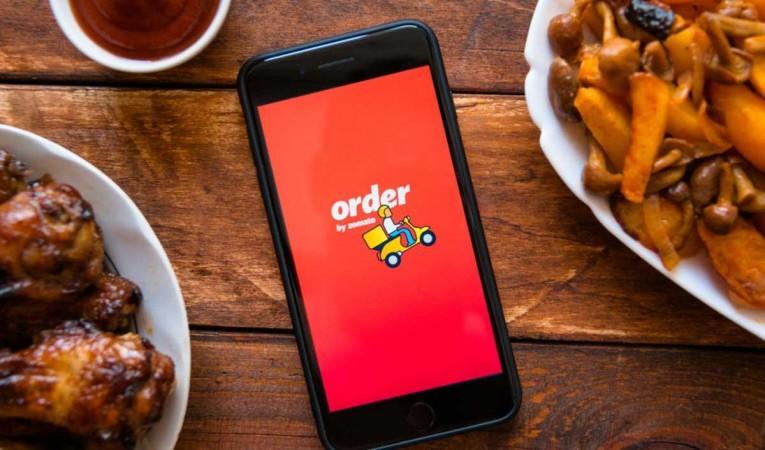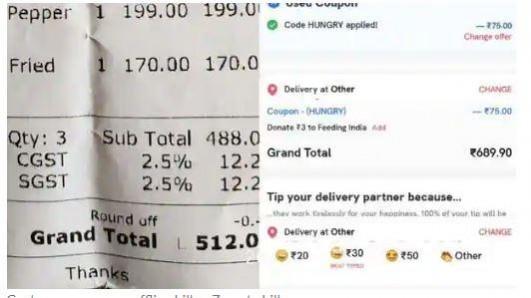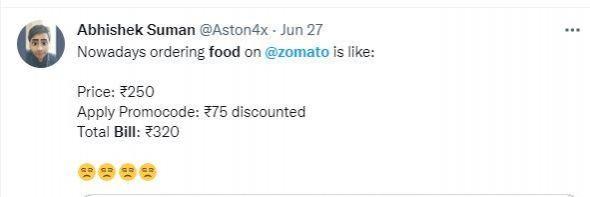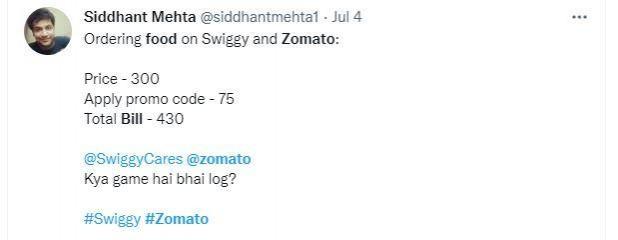Zomato became the household name that it is today, piggy riding on competitive rates and quick delivery to its patrons. But a recent post by a LinkedIn user may have put a huge question mark on the app being an economical way of getting meals at your doorstep.
The Linkdin user Rahul Kabra, made a comparison of online and offline food order bills and noticed a shock-worthy price difference between the two bills. The marketing manager shared two pictures of the same food order, but with different total bills.

In the bills, the food order is for black pepper sauce, vegetable fried rice, and mushroom momos. The total price for this food order, when made offline, stood at Rs 512, inclusive of taxes. While the total bill for the same food, when ordered at Zomato, stood at Rs 689.90 (this after applying a discount code of Rs 75). When the user did the math, he noticed that Zomato charged him Rs 178, which is 34.76% more than that food order.
The post further reads, "I think there is a need to cap this cost escalation which should be implemented by the government as to make this a win-win for all stakeholders." Kabra, also added, "Customer acquisition cost is what all start-ups are struggling with. Retention is the key to enhancing customer lifetime value. Zomato is always on top of my mind due to its constant omnichannel advertising! But I must say me being a normal value-driven Indian customer, at the end of the day will always make a price to benefit comparative analysis as an end result of any higher pricing."

Netizens vent out ...
By now, which millennial hasn't placed an order on Zomato. Many fumed at the thought of having been taken for a ride, without even knowing. While Kabra's post went viral on LinkedIn, the platform where it was originally shared, garnering more than 8k reactions and over 1k comments, other social media platforms were not far behind in taking note of the anomaly.
"This is sheer breach of trust. They make us believe that they offer the most competitive rates and quick delivery and pass on the benefit to the end consumer, whereas they do otherwise," wrote a user.
Same old issue, similar sentiment
Social media is not yet over the scandalous charge of Rs 442 for two bananas at a five-star property in Chandigarh. The bill, shared by actor Rahul Bose, saw the kind of virality that only shocked and amused netizens can offer.
The actor, who posted his bizarre moment in a video on social media, also shared that he was in the gym of the hotel when he ordered two bananas. The incident almost inspired the term 'Rahul Bose moment' wherein everyone came together to share the ridiculous prices they were charged for simple food in different corners of the world.
Swiggy admits to charging more
Last year, reacting to one of the posts by a user on social media, Swiggy admitted to charging more than the restaurants. A user from Bengaluru highlighted that prices of food items in Zomato or Swiggy were sometimes more than the actual price at restaurants, to which the food delivery app, replied, "Hi Raju, we understand your concern, and would like to inform you that we're trying to maintain transparency in our services and that extends to the pricing on the platform. However, the prices might be different online and offline as it is the sole discretion of the restaurant without any added input from our end."











